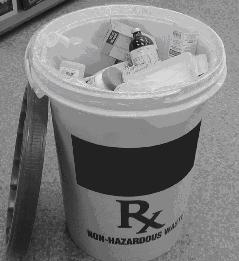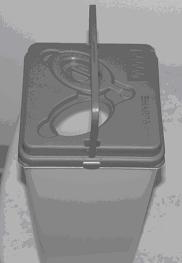Safe on-farm storage of unwanted medicines and sharps
Learn about the safe storage of used or unwanted livestock medicines and sharps.
ISSN 1198-712X, Published July 2005
This fact sheet was developed to provide producers with the resources they need to address the issue of safe storage of used or unwanted livestock medicines and sharps. Safe storage of unwanted medicines and sharps is recommended in the Livestock Medicines Education Manuals
This fact sheet is complementary to fact sheet 05-051, Responsible Disposal of Unwanted Medicines and Sharps. The charts on the back of these fact sheets are useful to you when they are displayed in a prominent location such as a bulletin board or refrigerator where medicines are kept (strip magnets with adhesive on one side can be attached to this side of the fact sheet). We recommend that you laminate this fact sheet to keep information from fading and to make it easier to keep clean.
This fact sheet will remind you and your staff about what to do with unwanted medicines and sharps. Write the contact information for your commercial storage container company on the line provided at the bottom of the chart.
For information on where commercial storage containers can be purchased, contact your veterinarian or check the yellow pages under "medical equipment suppliers" or "laboratory equipment suppliers" or contact a commercial medical waste disposal company.
What are unwanted medicines and sharps?
Unwanted medicines
- Medicines or vaccines that have expired.
- Medicines or vaccines you no longer need or want on the farm.
- Medicines or vaccines that have been spoiled and should not be used on animals.
Unwanted sharps
- Used and unused needles and scalpel blades.
- Syringes with needles attached.
How to store unwanted medicines safely — Never fill containers to the top!
Commercial containers
- Are leak-proof and resealable.
- Have a free-swinging handle that keeps hands clear of the pail.
- Come in a variety of sizes.
- Are clearly labelled: "Non-Hazardous Waste".
Non-commercial containers
- Should be leak-proof with a resealable lid.
- Could be empty paint containers or "picnic" coolers — remember to tape the valve shut on coolers.
- Must have the lid replaced and sealed after each deposit.
- Must be labelled with appropriate warnings.

How to store unwanted sharps safely — Never fill these containers to the top!
Commercial containers
- Are made of puncture-proof plastic.
- Are leak-proof.
- Have a free-swinging handle that keeps hands clear of the pail.
- Have lids that lock.
- Come in a variety of sizes.
- Are clearly labelled: "Bio-Medical Waste".
Non-commercial containers
- Should be puncture-proof, leak-proof and have a resealable lid.
- Are safest if made of metal, but must be protected from rusting.
- Could be empty paint or juice cans.
- Must have the lid on paint cans replaced and sealed each time sharps are deposited.
- Must have the openings in juice cans plugged with pieces of rubber, wood or duct tape.
- Must be labelled with appropriate warnings.

Where to dispose them while waiting for disposal
Storage area
- Ensure storage area is dry.
- Ensure storage area is locked to prevent access by unauthorized persons, children, livestock and pets.
- Clearly label the locked storage area with "Do Not Use For Treatment".
- Use separate storage areas for wanted and unwanted medicines to reduce the chance of selecting the wrong product (for example, expired medicine) for use in your livestock.
- Do not use containers that can be punctured:
- bleach bottles
- teat dip jugs
- udder wash jugs
- similar plastic jugs
- Do not use containers that can be broken:
- glass jars
- ceramic containers
Why worry about safe storage?
- Safe storage avoids injuries.
- Safe storage avoids disease transfer to people, livestock and wildlife.
- Safe storage avoids contamination of the environment with medicines.
Storage container contact information: _____________________________
Footnotes
- footnote[1] Back to paragraph Livestock Medicines Manuals are provided when you participate in a Livestock Medicines Education Program offered by Ridgetown College. For details about this program, phone: 1-877-480-9992 or see the Livestock Medicines Education Program website.
- footnote[2] Back to paragraph The Swine Medicines Manual is available to those who take the Swine Medicines Course offered by Ontario Pork. For details about this program, phone: 1-877-668-7675) or see the Ontario Pork website.
- footnote[3] Back to paragraph For information about the Environmental Farm Plan, phone the Ontario Soil and Crop Improvement Association at 519-826-4214 or see the Ontario Soil and Crop Improvement Association website.